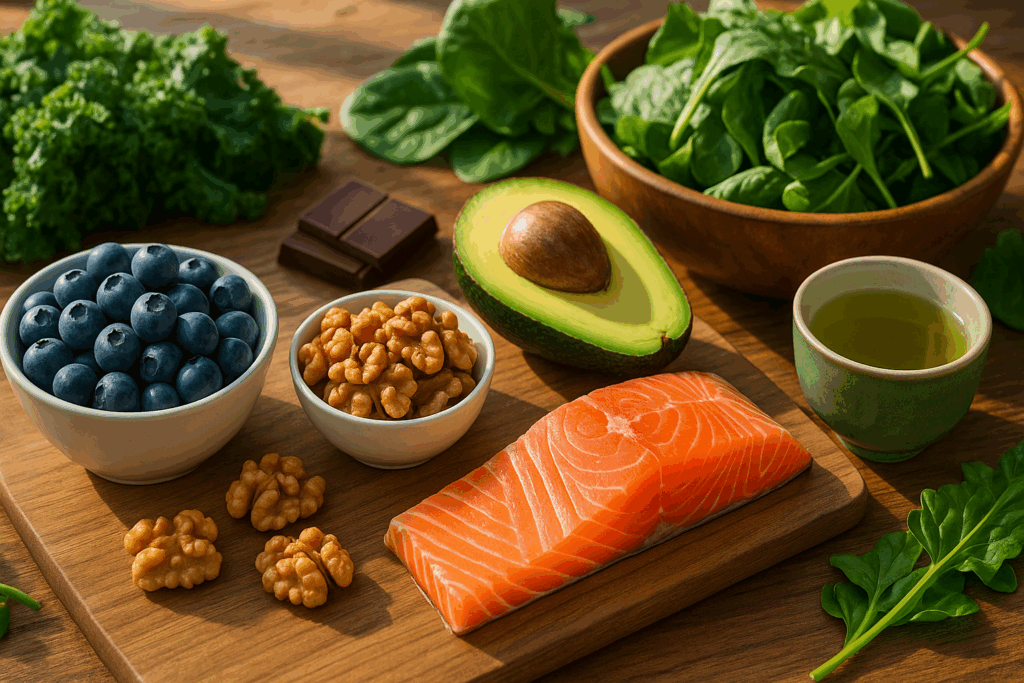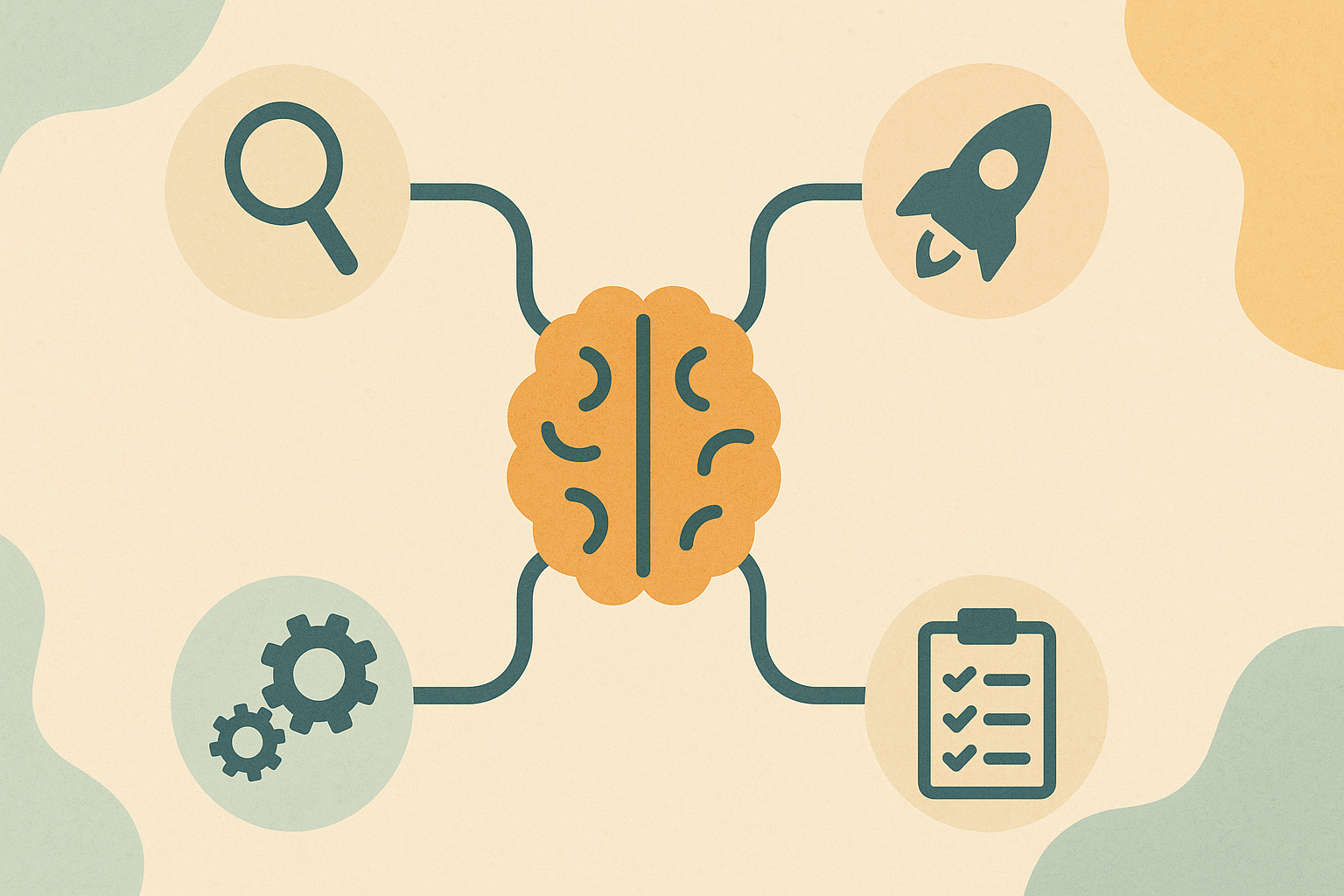Introduction: The Role of Nutrition in Cognitive Excellence and Managerial Success
In the complex arena of decision making in business management, the cognitive performance of leaders is paramount. Manager decisions often dictate the trajectory of entire organizations, influencing financial outcomes, company culture, and long-term strategic positioning. As industries evolve and challenges intensify, an increasing body of research highlights the profound link between nutrition and executive cognitive function. Understanding how specific natural foods can enhance decision making ability is crucial for business leaders who aim to optimize their mental clarity, strategic planning, and problem-solving skills.
You may also like: Navigating Life: Anxiety’s Impact on Decision-Making
This article explores how incorporating certain nutrient-dense foods into a daily diet may sharpen decisions made by managers, bolster memory retention, and enhance focus—skills that are fundamental to the seven steps of decision making. We will also discuss the broader context of how many steps are in the decision making process, which step comes first in the decision making process, and how improved cognitive support translates into better workplace outcomes. This exploration, grounded in scientific evidence and practical application, aligns with the core mission of Nootropics Planet to empower individuals through the synergy of nutrition and cognitive excellence.

Understanding the Foundations of Decision Making in Management
Decision making in management is both an art and a science, requiring critical thinking, emotional intelligence, and strategic foresight. Whether contemplating minor operational adjustments or major capital investments, the steps involved follow a logical progression. Scholars often debate how many steps are in the decision making process, but the most commonly accepted models cite five, seven, or eight stages, each emphasizing information gathering, analysis, and evaluation.
Typically, the 7 step decision making process starts with identifying the problem, followed by gathering relevant information, analyzing the alternatives, choosing among them, implementing the decision, monitoring results, and finally, learning from the outcome. Understanding which step comes first in the decision making process—problem identification—is vital, as a misdiagnosed issue can derail the entire sequence. Manager decisions are, therefore, best made with a sharp, focused mind, capable of nuanced reasoning and strategic foresight.
Cognitive Demands on Managers: Why Brain Health Matters
The decisions made by managers are not isolated events; they are cumulative expressions of analytical rigor, emotional resilience, and creative insight. In fast-paced corporate environments, managers must sift through vast amounts of information, weigh risks against potential rewards, and anticipate market fluctuations—all while maintaining composure under pressure. Consequently, good decision making is related to being mentally agile, emotionally balanced, and physically resilient.
Foods that nourish brain cells, regulate neurotransmitters, and reduce oxidative stress can directly influence decision making at work examples, particularly when managers face high-stakes situations. By enhancing the biological underpinnings of cognition, nutrition becomes a strategic tool for optimizing managerial performance throughout the development decision making journey.

Blueberries: The Cognitive Powerhouse
Blueberries, often called “brain berries,” are renowned for their high antioxidant content, particularly anthocyanins, which cross the blood-brain barrier and localize in areas of the brain essential for intelligence. Studies show that regular consumption of blueberries can significantly improve memory, executive function, and even delay brain aging. Given that decision making in business management requires sustained attention and quick information recall, blueberries serve as an ideal dietary addition for managers aiming to sharpen their cognitive edge.
Incorporating blueberries into your daily routine may not only enhance the ability to make decisions but also strengthen the critical stages of the 5 steps of decision making, especially when gathering and evaluating alternatives. Whether added to smoothies, cereals, or eaten as a snack, their benefits are cumulative and profoundly supportive of complex managerial functions.
Walnuts: Fuel for Memory and Analytical Thinking
Rich in DHA, a type of omega-3 fatty acid, walnuts are directly associated with improved cognitive performance and neuroprotection. Numerous studies link walnut consumption to better memory, faster information processing, and heightened emotional regulation—all critical elements in decision making at work examples.
Managers grappling with the seven steps in the decision making process can particularly benefit from walnuts’ ability to support logical reasoning and minimize mental fatigue. By providing a steady supply of anti-inflammatory nutrients, walnuts enable managers to navigate development decision making processes with clarity and resilience, ensuring that each choice reflects well-informed strategic foresight.
Salmon: Enhancing Executive Function
Salmon is a premier source of EPA and DHA, two omega-3 fatty acids that play pivotal roles in maintaining the structure and function of brain cell membranes. Consuming salmon regularly has been associated with improved executive functions such as planning, organizing, and impulse control—skills essential for effective decision making in management.
When navigating the seven steps of decision making, including implementing and monitoring results, managers require sustained cognitive energy and emotional equilibrium. Salmon’s potent anti-inflammatory properties help mitigate the cognitive decline associated with chronic stress, a common occupational hazard for executives tasked with high-stakes decisions.

Avocados: Sustaining Cognitive Endurance
Avocados are a rich source of monounsaturated fats that promote healthy blood flow, ensuring that the brain receives a steady supply of oxygen and nutrients. Enhanced circulation is key for optimal cognitive performance, particularly during prolonged development decision making sessions.
Manager decisions often involve the five decision making steps, requiring sustained mental energy over extended periods. Incorporating avocados into meals can help maintain stable glucose levels, preventing the cognitive crashes that impair judgment and strategic thinking. As part of a holistic approach to brain health, avocados exemplify the symbiotic relationship between physical nourishment and cognitive vitality.
Dark Chocolate: The Sweet Path to Sharper Decisions
Dark chocolate, particularly varieties containing 70% or higher cocoa content, is packed with flavonoids that enhance neuroplasticity, improve blood flow to the brain, and stimulate the production of brain-derived neurotrophic factor (BDNF). These effects collectively bolster decision making ability and memory retention, crucial for mastering the eight steps in the decision making process.
For managers seeking to optimize decisions made by managers, a small daily portion of dark chocolate can be a strategic dietary tool. Its immediate impact on mood and cognitive function makes it particularly useful during high-pressure periods such as quarterly planning or crisis management scenarios.
Green Tea: The Synergy of Calm and Alertness
Green tea contains a unique combination of caffeine and L-theanine, which together enhance alertness while promoting relaxation. This synergy fosters a mental state highly conducive to effective decision making in business management, where calm, focused analysis often determines success.
Navigating the five stages of decision making process requires the ability to stay alert without succumbing to stress-induced tunnel vision. Regular consumption of green tea can therefore support better decision making at work examples, providing managers with the cognitive flexibility needed to evaluate options thoroughly and act decisively.

Leafy Greens: Building Cognitive Resilience
Spinach, kale, and Swiss chard are rich in folate, vitamin K, and beta-carotene—nutrients that have been shown to slow cognitive decline and enhance memory. These vegetables strengthen the neural circuits involved in the seven steps of decision making, improving the speed and accuracy of information processing.
Incorporating leafy greens into daily meals can help managers reinforce the neural pathways essential for every step in the decision making process, from defining problems to learning from outcomes. Their powerful combination of antioxidants and micronutrients creates a resilient cognitive foundation for sustained managerial excellence.
How Nutrition Supports the Stages of Decision Making
To understand the impact of nutrition on decision making ability, it is essential to revisit the models that describe how many steps are there in the decision making process. Whether one follows the 5 steps of decision making, the 7 step decision making process, or the more detailed 8 steps in the decision making process, each model highlights distinct cognitive challenges.
Nutrition enhances each stage—from recognizing opportunities (first step) to evaluating outcomes (final step). Foods that boost memory assist in gathering relevant information; those that promote focus aid in analyzing alternatives; and those that stabilize mood support implementing and monitoring decisions. Thus, the right dietary choices play an essential role in the full arc of decision making in management.
Enhancing Memory and Learning: Implications for Exam Preparation
Interestingly, many of the foods discussed also play a role in academic contexts, particularly when considering what you read for exams or how to remember stuff when studying. The parallels between studying for tests and strategic decision making in business management are striking, as both require efficient information processing, memory recall, and critical analysis.
Natural foods like blueberries, walnuts, and green tea not only support what you read for exams but also enhance the ability to make decisions under pressure. Techniques for how to memorize something for a test, such as spaced repetition and active recall, can be significantly bolstered by a diet rich in brain-supportive nutrients. Managers who incorporate these foods into their routines may find that they remember things while studying business reports and strategic plans more effectively, leading to sharper, more agile decision making at work examples.
The Neurobiology of Decision Making and Nutrition’s Role
The brain’s decision-making networks rely on a complex interplay of neurotransmitters such as dopamine, serotonin, and acetylcholine. Nutrients from natural foods directly influence the production and balance of these chemicals, thus modulating emotional regulation, reward evaluation, and risk assessment.
For instance, dopamine, associated with reward-seeking behavior, is enhanced by foods rich in tyrosine (such as almonds and bananas). Serotonin, crucial for mood stability, can be boosted by foods high in tryptophan like turkey and eggs. Acetylcholine, important for memory and attention, is supported by choline-rich foods like eggs and broccoli.
By aligning dietary choices with the biological demands of decision making in business management, managers can create a physiological environment conducive to high-level executive function, reinforcing the core skills needed across the list of steps of decision making process.

Frequently Asked Questions: Top Natural Foods for Decision Making in Business Management
What are some lesser-known foods that may boost decision making in management beyond those commonly discussed?
While popular foods like blueberries and salmon often take the spotlight, lesser-known options like pumpkin seeds and beets also enhance decision making in management. Pumpkin seeds are rich in magnesium, zinc, and iron, all essential for nerve transmission and stress regulation. These nutrients directly support memory and analytical thinking, enhancing decisions made by managers during high-pressure tasks. Beets, on the other hand, increase nitric oxide in the blood, improving cerebral blood flow and allowing clearer thinking throughout the seven steps of decision making. Including such foods diversifies the nutritional arsenal for improving decision making in business management.
How can hydration impact manager decisions during critical projects?
Hydration plays a far more crucial role in decision making in business management than many realize. Mild dehydration can impair cognitive flexibility, a key factor in the five decision making steps managers must navigate daily. Decisions made by managers during strategic planning sessions often involve rapid shifts in attention, and optimal brain function requires a well-hydrated system. Sipping water infused with citrus fruits or mint can further enhance mental clarity, ensuring that manager decisions are based on sharp, focused analysis rather than cognitive fatigue. Small habits like monitoring hydration can compound over time to significantly improve decision making ability.
Are there specific times of day when eating brain-boosting foods is most beneficial for decision making at work?
Yes, timing food intake strategically can optimize decision making at work examples, especially when aligned with circadian rhythms. Consuming foods high in complex carbohydrates and healthy fats, like oatmeal with walnuts, in the morning can sustain energy for the initial stages of decision making in management. As the day progresses, lighter, antioxidant-rich foods like berries and leafy greens can help counteract mental fatigue, supporting the later stages of manager decisions such as evaluation and adjustment. Understanding how meals impact focus and stamina offers managers a practical way to enhance performance across the eight steps in the decision making process. Tailoring meals to cognitive demand is an often-overlooked factor in development decision making.
What are the social and psychological impacts of good nutrition on decisions made by managers?
Good nutrition not only improves cognitive function but also enhances emotional regulation, which is vital for decisions made by managers. Leaders who maintain stable blood sugar levels and neurotransmitter balance are better equipped to handle interpersonal conflict and team dynamics. Decision making in business management often involves navigating sensitive situations where emotional intelligence determines outcomes as much as logical analysis. Nutrient-rich diets that promote serotonin and dopamine production foster a more resilient, composed demeanor in high-stress environments. Therefore, nutrition supports both the analytical and relational components of manager decisions, leading to more holistic and empathetic leadership.
How do natural foods influence the long-term development of decision making ability in managers?
Over time, consistent intake of brain-supporting nutrients strengthens neural pathways associated with executive function and strategic thinking. This neuroplastic enhancement facilitates the faster and more accurate execution of the seven steps of decision making. Managers who prioritize diet early in their careers may experience sustained improvements in decision making ability, resilience under stress, and creative problem-solving. The cumulative effect of daily nutritional choices becomes evident during complex projects that demand the integration of vast data sets and competing priorities in decision making in management. Investing in nutrition is, therefore, an investment in the enduring quality of manager decisions.
Can natural foods improve the speed at which decisions made by managers are executed?
Natural foods can indeed enhance both the quality and speed of decisions made by managers by optimizing cognitive processing and neural efficiency. Foods rich in antioxidants, omega-3 fatty acids, and B vitamins support rapid synaptic transmission, a critical aspect of quick, accurate decision making in business management. Managers often operate within narrow windows for action, where delays can result in missed opportunities. By boosting cognitive speed and reducing mental fatigue, brain-supportive diets enable more decisive action across the five decision making steps. Quick and confident manager decisions often distinguish successful leaders from their less agile counterparts.
What emerging research trends connect nutrition to decision making in business management?
Emerging research increasingly focuses on the gut-brain axis and its profound influence on decision making in business management. Probiotics and prebiotics, found in foods like yogurt, kefir, and chicory root, have been linked to improved mood, reduced anxiety, and sharper cognitive function. This gut-brain connection suggests that supporting digestive health can indirectly enhance manager decisions through improved neurotransmitter production. New studies also explore how specific polyphenols found in foods like green tea and cocoa can enhance neurogenesis and cognitive endurance over time. Keeping abreast of such trends allows organizations to support decisions made by managers with cutting-edge nutritional strategies.
Are there specific foods managers should avoid to maintain optimal decision making ability?
Indeed, certain foods can impair decision making ability, particularly those high in refined sugars, trans fats, and artificial additives. Excess sugar consumption leads to rapid blood sugar spikes and crashes, undermining sustained focus across the seven steps of decision making. Similarly, trans fats can induce inflammation that hampers synaptic function, diminishing the cognitive flexibility essential for agile manager decisions. Regular intake of heavily processed foods may also increase the risk of mood disorders, which can cloud judgment in decision making in management. Being mindful of what to avoid is as crucial as selecting brain-boosting foods.
How can organizations encourage better nutrition to support decision making at work examples?
Organizations play a pivotal role in shaping the nutritional environments that support effective decision making at work examples. Providing healthy snacks like nuts, fruits, and yogurt at meetings fosters better decision making ability among managers. Offering educational workshops on the link between diet and cognitive performance can reinforce the value of mindful eating in development decision making. Companies might also consider partnering with wellness programs that focus specifically on enhancing decision making in business management through dietary interventions. Cultivating a culture that prioritizes brain health ultimately leads to stronger, more resilient decisions made by managers at all levels.
What are some practical daily habits managers can adopt to align nutrition with critical stages of decision making in management?
Managers can create simple yet powerful routines to synchronize nutrition with decision making in management tasks. Starting the day with a nutrient-dense breakfast, such as a smoothie rich in leafy greens and berries, primes the brain for the first steps of decision making. Incorporating short breaks for hydration and light snacking with foods like almonds or dark chocolate can sustain focus through mid-day strategy sessions. Ending the workday with a light, anti-inflammatory meal helps consolidate learning and prepares the mind for the reflection stages critical to evaluating decisions made by managers. Building these habits into daily routines ensures that nutrition consistently supports high-level cognitive function without requiring major lifestyle overhauls.

Conclusion: Nourishing the Mind for Better Manager Decisions
Achieving excellence in decision making in management requires more than just training and experience; it demands the cultivation of a brain capable of sustained, nuanced, and resilient thought. By integrating natural, brain-boosting foods such as blueberries, walnuts, salmon, avocados, dark chocolate, green tea, and leafy greens into their diets, managers can fortify the cognitive foundations necessary for mastering the seven steps of decision making and beyond.
Understanding how many steps are in the decision making process and recognizing which step comes first in the decision making process highlights the necessity of cognitive clarity at each phase. From problem identification to outcome evaluation, every stage is sharpened by a nourished mind. As a result, decisions made by managers are more strategic, agile, and effective, embodying the best practices of modern business leadership.
In a world where business environments are increasingly volatile and complex, the synergy between nutrition and cognitive performance offers a powerful, evidence-based strategy for success. By making mindful dietary choices, managers not only enhance their own decision making ability but also inspire a culture of excellence, resilience, and strategic foresight throughout their organizations.
Further Reading:
Management Decision Making: Overview, Process, Types, and Tools


